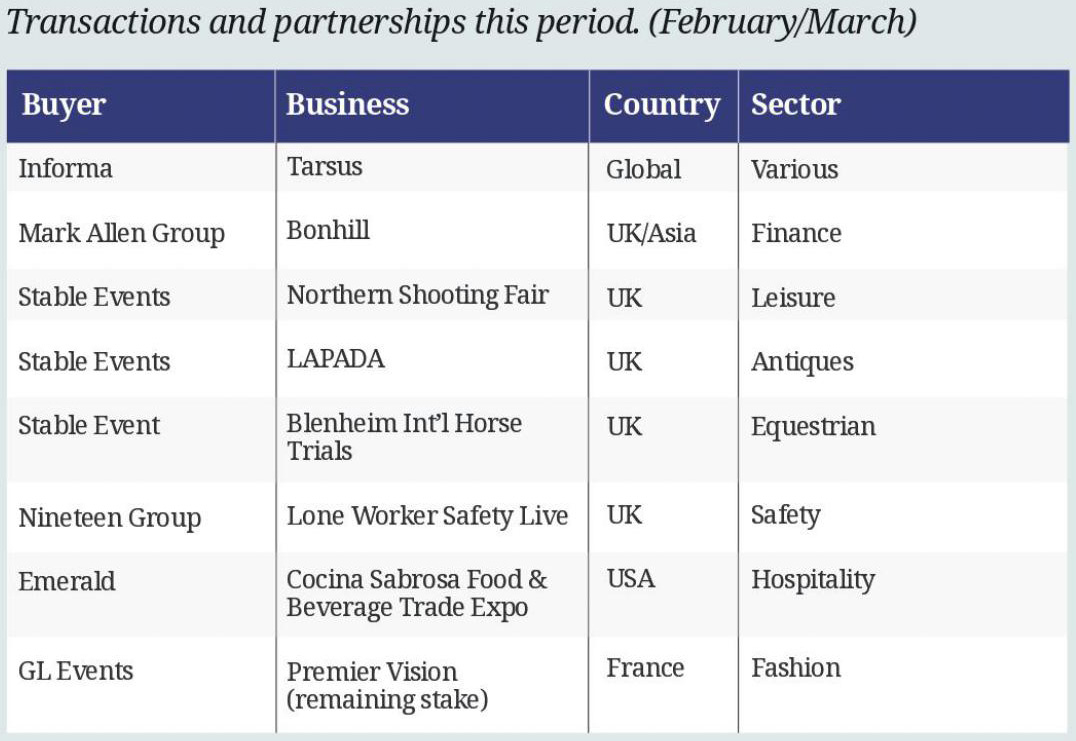Steve Monnington digs into a billion-dollar deal that came out of the blue
The news came to me out of the blue at 7.15am on a Thursday morning by a simple Whatsapp message from Tarsus CEO Douglas Emslie: ‘Not every day you do a billion-dollar deal! Just announced we’ve sold Tarsus to Informa. End of a 25-year build. Emotional day.’ The biggest exhibition M&A news of the year so far was a complete surprise for several reasons.
The price. $940m upfront and $45m deferred consideration payable if (or when) the Informa share price hits 850p within two years – it was 675p before the announcement. At this valuation Informa are clearly showing their confidence in the recovery and long term growth of the exhibition sector. The quoted multiple in their announcement of 9.9x Average 2023/24 EBIT (Tarsus have biennial shows which are weighted towards the odd years) is after allowing for synergies (aka cost savings) of $20m. This allows Informa to market the deal with a lower multiple.
Adjusting for this and factoring in the deferred consideration plus tax losses and working capital, the multiple could be considered to be as high as 14x. This would mean that we‘re firmly back in the land of pre-Covid chunky double digit multiples last seen when Providence bought CloserStill Media and Charterhouse originally took Tarsus private in 2019.
The timing of the exit. It was widely assumed (including by Tarsus themselves) that Charterhouse would exit around 2025, Tarsus has 25% of its business in China, which has only started to open up in January this year so the overall business hasn’t yet recovered. This is also true of Informa’s business for the same reason, hence the confidence in the upside in their share price.
Private Equity selling to a trade buyer without a bidding war. Why would Charterhouse sell now if all this growth is to come and, more to the point, why would they sell to the first bidder rather than run a process?
There are several reasons why Charterhouse agreed to sell now and to Informa in particular. The valuation was good, based on the next two years and therefore the coming recovery was built in. After company debt is deducted the deal is broadly 50% cash and 50% Informa shares. The cash can be deployed back into Charterhouse’s investment portfolio with potentially larger gains being achieved elsewhere. The Informa shares, which Charterhouse have to hold for two years, should yield a gain of at least 25% as Informa’s business recovers.
The speed of the deal. Most transaction take at least six months. The initial call came from Informa at the end of January but there was a catch – they wanted to announce the transaction at the same time as their 2022 results which gave them just five weeks to negotiate an agreement, carry out due diligence and negotiate the legal documentation. Ironically having done this at breakneck
speed, the transaction won’t actually complete until June/July after the US competition authorities have given clearance. At least this gives plenty of time for both companies to prepare for integration and for the Tarsus director/shareholders to plan how to spend their money.






